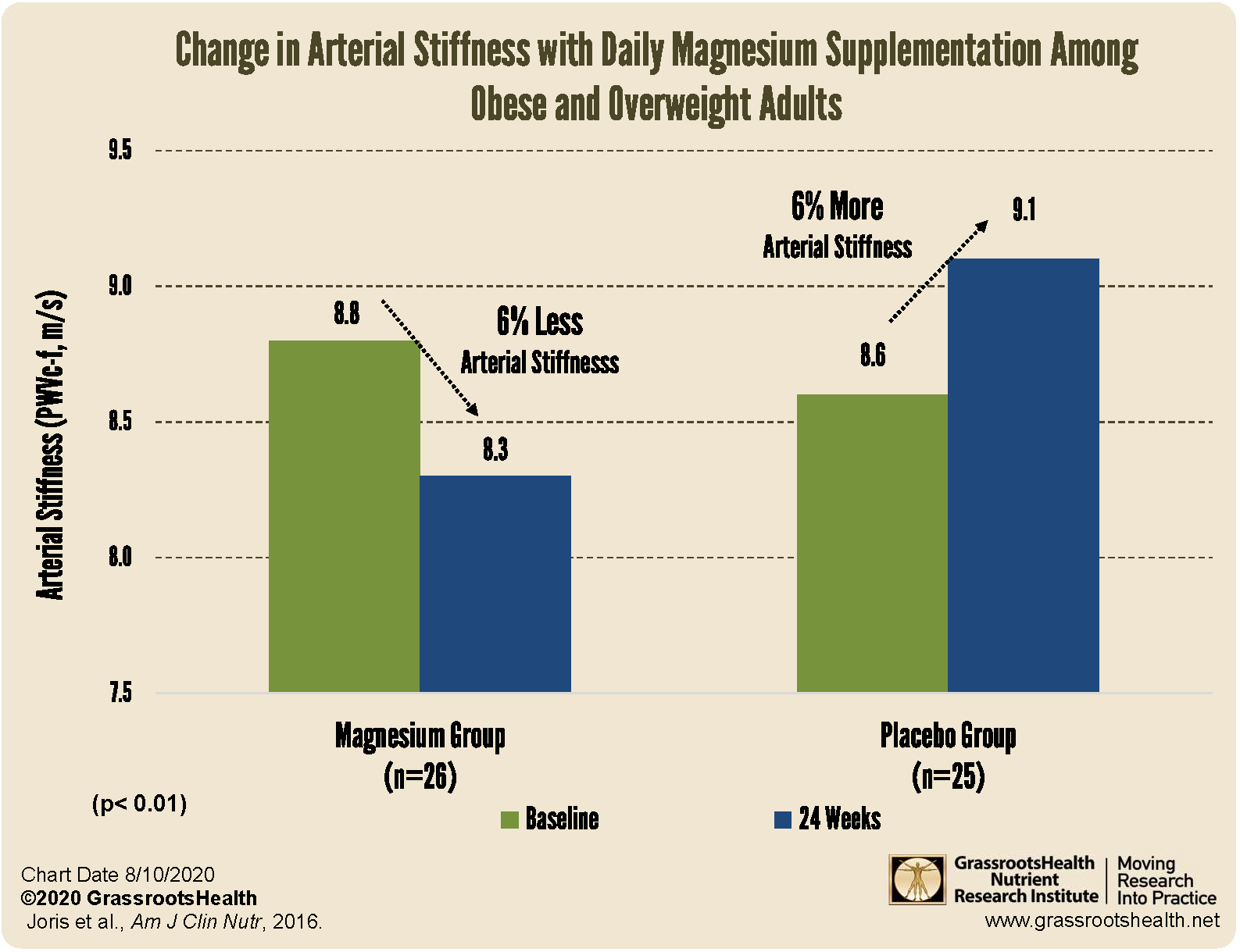Published on August 12, 2020
Magnesium has been shown to have a strong relationship to cardiovascular health. One previously reviewed study showed how magnesium uses the same pathway as statins to lower LDL cholesterol and raise HDL cholesterol to reduce inflammation, clotting, and plaque formation in the arteries. Another study illustrated how magnesium helps regulate the heartbeat by controlling the sodium potassium pump and extending the relaxation period after contraction, which may help lower the risk of atrial fibrillation, or irregular heartbeat. Adequate intake of magnesium from the diet or supplemental sources is necessary for maintaining cardiovascular health and reducing the risk of cardiac events, even the risk of death due to cardiovascular disease.
Study Shows Improved Arterial Health with Magnesium
 Joris et al. conducted a randomized, double-blind, placebo controlled study to evaluate the effects of magnesium supplementation on arterial stiffness. The study included 52 overweight or slightly obese participants, 30 of which were male and 22 were female, with the average age of 62 years. Participants received either 350 mg per day of magnesium (117 mg taken 3 times each day) or placebos.
Joris et al. conducted a randomized, double-blind, placebo controlled study to evaluate the effects of magnesium supplementation on arterial stiffness. The study included 52 overweight or slightly obese participants, 30 of which were male and 22 were female, with the average age of 62 years. Participants received either 350 mg per day of magnesium (117 mg taken 3 times each day) or placebos.
Arterial stiffness was assessed at baseline and again after 12 and 24 weeks using the carotid-to-femoral pulse wave velocity (PWV c-f), a measurement of the forward pressure wave traveling along the aorta, which is considered the gold-standard method for quantifying arterial stiffness.
What did the study find?
After 24 weeks of daily supplementation with either magnesium or placebo, arterial stiffness was significantly improved in the magnesium group compared to the placebo group (p<0.01). At the end of the study, those taking magnesium daily saw a 6% decrease in arterial stiffness, and those taking placebos saw a 6% increase in arterial stiffness. While there was no statistical difference in blood pressure between the two groups (considered an independent predictor of arterial stiffness), the authors conclude that these findings suggest that magnesium itself may play a mechanistic role in cardiovascular health through its own effect on the arterial walls, possibly in relation to improving vascular tone, enhancing endothelial function, or reducing inflammation and oxidative stress.
Could a lack of magnesium be affecting your heart health?
Are you getting enough magnesium through your diet and with supplements? Have you measured your magnesium levels lately to make sure? Test your levels today, and adjust your supplementation and/or diet as needed to ensure you are getting enough magnesium to support healthy cardiovascular function.
Are You Getting Enough Vitamin D?
Do you know what your vitamin D level is? Be sure to test today to find out, and take steps to keep it within a target of 40-60 ng/ml or 100-150 nmol/L! Give your immune system the nutrients it needs to support a healthy you and protect yourself from unnecessary diseases.
Through GrassrootsHealth Nutrient Research Institute, you can also test your essential elements magnesium, copper, zinc and selenium, toxins such as lead, mercury and cadmium, as well as your omega-3 levels, inflammation levels and thyroid stimulating hormone (TSH) level. Find out your levels today! Log on to the test selection page (click the link below) to get your tests and see for yourself if your levels can be improved.
Make sure you track your results before and after, about every 6 months!
How can I track my nutrient intake and levels over time?
To help you track your supplement use and nutrient levels, GrassrootsHealth has created the Personal Health Nutrient Decision System called
For each specific supplement, you can track what days you take it, how much, and many other details. This will help you know your true supplemental intake and what patterns of use work for you to reach and maintain optimum nutrient levels. Check it out today!








